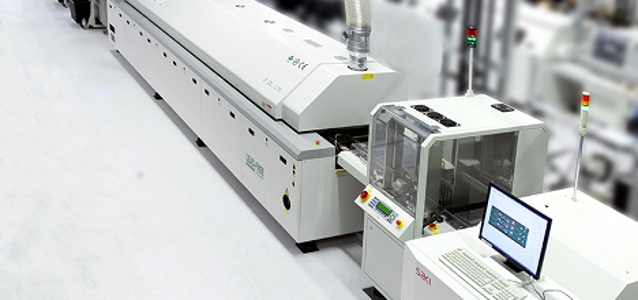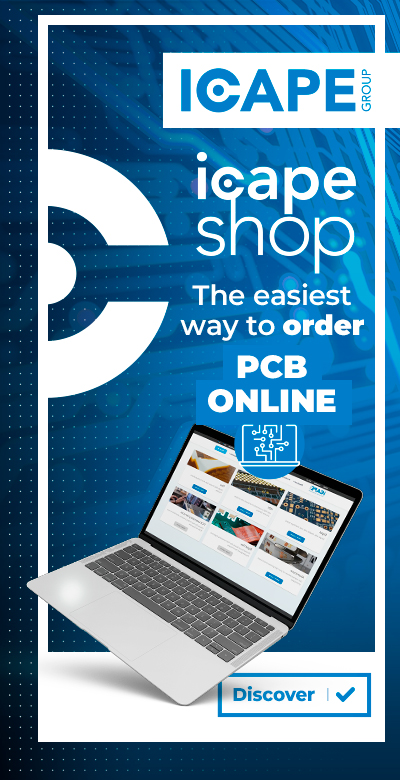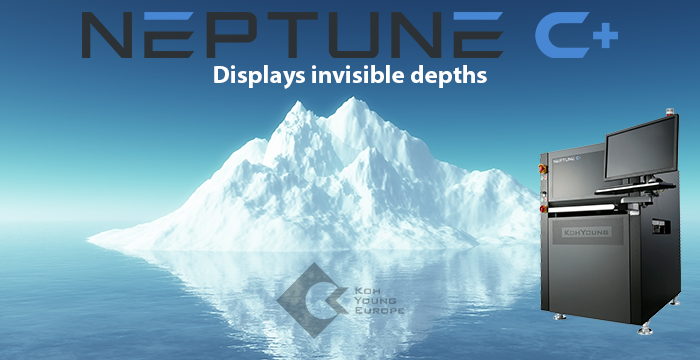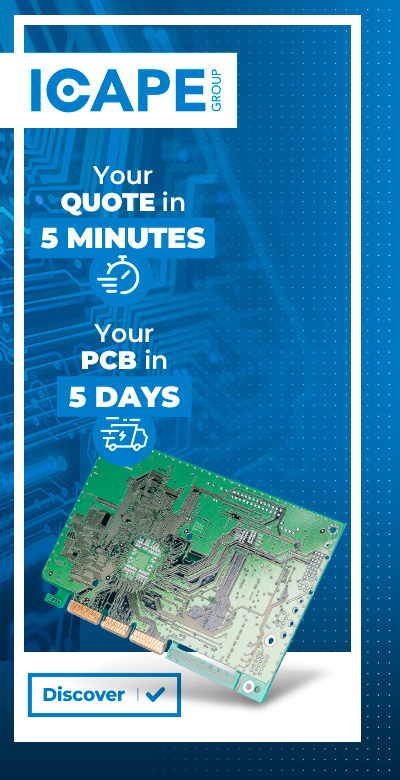
© Juki
Electronics Production |
Interview with Johann Weber, chairman of the board of Zollner Elektronik group
Zollner Elektronik AG is the largest and most influential EMS company in Europe. Within only 50 years they have succeeded to grow from a one-man business to a global corporation with 16 sites.
This is a product release announcement by Juki. The issuer is solely responsible for its content.
Over 100 assembly lines are in operation to produce boards under the highest quality requirements. Juki Europe was allowed to install the newest complete production line at the plant located in Untergschwadt (Germany), where avionic and outer space products are manufactured. Juki had the opportunity to question Mr. Weber, chairman of the board of Zollner Elektronik group, about the reasons for their success.
The EMS market environment proved to be very difficult during the last few years. Like in the Juki market of capital equipment, also the EMS providers have to fight against dropping margins. A consolidation has set in too. How does Zollner fight against this trend? What is your recipe for success?
Mr. Weber: “The success recipe is multifaceted. On one side we can assess that we have grown together with our customers. We’ve lost none of our big customers, so that we could enhance in both of our strategic directions of impact. The two strategic directions are not only to supply the series, but also to support our customers from the very beginning of the product development onwards, that means to be there already during the formation phase. With our broad range, we cover the whole product life cycle just the way the customers would like to have it. In doing so, we offer a surplus to the customers.
The second strategic direction, the increase of the vertical integration, is to provide everything from initial batch over electronic assembly groups up to complete modules, devices and systems and all of this again demand-oriented, exactly the way the customers wishes. That’s why we have on both counts the possibility to support the customers very large-scaled and thereby to meet their needs very early. Because technologies become more and more complex nowadays it is very important to exchange experiences and to bring everything to one common denominator. Another point is that we act not only in one or two industrial sectors but that we have a homogeneous diversification of trades and industry.
No matter if it’s an automotive sector or aerospace, pharmaceutical or instrumentation, we go with all sectors. Here the success goes in the direction that, when single sectors fluctuate strongly, we can always accomplish compensation thanks to our worldwide, broad and versatile orientation, because not all sectors fluctuate at the same time. Summarising one can say that our recipe for success is composed of many small areas, but the customer’s faith and the tight personal and sustainable contact are for sure two very important components.”
 © Juki
What does Zollner expect from system providers and partners in the future? How must their product and service ranges look like to sanely survive the cut-throat competition and to remain or to become a partner of Zollner?
Mr. Weber: “We always see the partnership as a team work in the foreground. To me personally this doesn’t mean that one is the partner and the other one works. A real mutual partnership, where ups and downs are experienced together, where both develop synergies, where both also get the additional benefits from each other, where both are linked together, where both have advantages from the other’s network and where both can connect themselves to one big network.
There I see a long-term, sustainable partnership, where one can assume that this partner enhances their products, that he absorbs and implements new trends, that he can correspondingly fulfil the market’s challenges today and also tomorrow and that he stays financially stable despite the cut-throat competition. Actually, it always rotates around the same four factors. One is quality, which must be just available. The second is high flexibility, which is also demanded more and more in the market.
The third is, of course, the cost pressure we all are under. The fourth are innovations. With them, one can adjust a lot. These four pillars are strongly linked to one another. And if it’s possible to commit at this point to a long-term, sustainable partnership, then both sides stand to benefit from it.”
Mr. Weber, thank you very much for the interview.
© Juki
What does Zollner expect from system providers and partners in the future? How must their product and service ranges look like to sanely survive the cut-throat competition and to remain or to become a partner of Zollner?
Mr. Weber: “We always see the partnership as a team work in the foreground. To me personally this doesn’t mean that one is the partner and the other one works. A real mutual partnership, where ups and downs are experienced together, where both develop synergies, where both also get the additional benefits from each other, where both are linked together, where both have advantages from the other’s network and where both can connect themselves to one big network.
There I see a long-term, sustainable partnership, where one can assume that this partner enhances their products, that he absorbs and implements new trends, that he can correspondingly fulfil the market’s challenges today and also tomorrow and that he stays financially stable despite the cut-throat competition. Actually, it always rotates around the same four factors. One is quality, which must be just available. The second is high flexibility, which is also demanded more and more in the market.
The third is, of course, the cost pressure we all are under. The fourth are innovations. With them, one can adjust a lot. These four pillars are strongly linked to one another. And if it’s possible to commit at this point to a long-term, sustainable partnership, then both sides stand to benefit from it.”
Mr. Weber, thank you very much for the interview.
What is Zollner’s advice for small EMS companies to assert themselves in the market? Mr. Weber: “It is most important that these companies are linked; that they contribute actively in a network. It doesn’t matter if this happens over an association or college, university and/or over an intensive collaboration with suppliers, manufacturers or customers. In these days it’s simply not possible to know everything yourself. That’s why one has to find out who knows what and where. Therefore networks are certainly very important. Problems and questions will always occur and then it’s good to know somebody who can help and show you new paths. Smaller companies should also be concerned with new technologies and new trends, as, for example, “Industry 4.0” – everybody is talking about – and new product technologies. One has to keep at it all the time. And therefore a close partnership in the network is very advantageous. This also counts concerning the acquisition of new production equipment. Today, one has to evaluate not only the best systems but also the best long-term partner. There, networks are of big use. How will the EMS world look like in five years? Mr. Weber: “Well, first of all I have a hope and, of course, I hope that it will be fulfilled. No way can it stay the same it was in the PCB industry for the last five, ten or even twenty years, namely that the number of manufacturers drastically decreases and that the order volume migrates more and more to Asia. I’m strongly convinced that we can satisfy and elate our customers with good innovations, high flexibility and very good quality. Nowadays, the expression “low cost country” no longer counts, but rather the term “best cost country” counts. And here, the entire consideration is the point, as “lowest cost of ownership” - one has to comprise the whole lot. In the future, the market will become more and more an impulse generator and the more the market dictate the pulse the more flexible we have to be and the bigger are the chances to keep the electronic industry on the same level here in Europe and Germany, or even to expand it.” To date, Zollner always focused on the same German providers for assembly lines. They are rather established in the “high price – high performance” sector. Now, you invested for the very first time in a complete Juki line including printer and oven. This line is installed in one of the most important plants concerning quality: namely in the Zollner plant aerospace and outer space. What brought Zollner in this case to trust in capital equipment from outside Germany, namely from Japan and China? Mr. Weber: “Well, we have already bought the first JUKI assembly line a few years ago. Back then, the JUKI line mainly convinced us in terms of LED assembly under different software solutions for the binning subject as well as through the LED handling. During the last four years, JUKI proved that the systems are in a class of their own in the matter of long-term quality and “lowest cost of ownership”. Now the same decision was pending, because we continuously enhanced this technology. Today, we bank on complete production systems with completely integrated intelligence and traceability. Nowadays, the cost structure of the systems is also important. JUKI has enhanced very strongly in the last few years and today offers complete production solutions. This is very interesting for Zollner. The fist experiences were good, the confidence is there and therefore we want to further deepen and expand this partnership and I’m sure, that we will get the needed support from JUKI on this.” Many talked about the “Industry 4.0” concept at Productronica in Germany. How does Zollner set up to this subject? Mr. Weber: “In the future, a very close co-operation must take place between the colleges and universities and the different industrial associations. Only there can an implementation concept be specified and a code of practice can be generated together. Certainly, these have to be intensively optimised and improved. How do we comprehend it? The processes should be self-controlled. Not only intelligent products but also those that have just a barcode should be controlled by the computer. The traceability should take place over the whole line. The more complicated a product is the more important it is to already include the solder paste print into the control loop. The cycle should not only be monitored and documented but also the necessary process actions for correction or even for an assembly interrupt should happen automatically and in a self-adjusting way. Not only the production process, also the information process should be monitored. The market will head for real complete providers which develop these processes single-handedly and integrate them into their systems.© Zollner
 © Juki
What does Zollner expect from system providers and partners in the future? How must their product and service ranges look like to sanely survive the cut-throat competition and to remain or to become a partner of Zollner?
Mr. Weber: “We always see the partnership as a team work in the foreground. To me personally this doesn’t mean that one is the partner and the other one works. A real mutual partnership, where ups and downs are experienced together, where both develop synergies, where both also get the additional benefits from each other, where both are linked together, where both have advantages from the other’s network and where both can connect themselves to one big network.
There I see a long-term, sustainable partnership, where one can assume that this partner enhances their products, that he absorbs and implements new trends, that he can correspondingly fulfil the market’s challenges today and also tomorrow and that he stays financially stable despite the cut-throat competition. Actually, it always rotates around the same four factors. One is quality, which must be just available. The second is high flexibility, which is also demanded more and more in the market.
The third is, of course, the cost pressure we all are under. The fourth are innovations. With them, one can adjust a lot. These four pillars are strongly linked to one another. And if it’s possible to commit at this point to a long-term, sustainable partnership, then both sides stand to benefit from it.”
Mr. Weber, thank you very much for the interview.
© Juki
What does Zollner expect from system providers and partners in the future? How must their product and service ranges look like to sanely survive the cut-throat competition and to remain or to become a partner of Zollner?
Mr. Weber: “We always see the partnership as a team work in the foreground. To me personally this doesn’t mean that one is the partner and the other one works. A real mutual partnership, where ups and downs are experienced together, where both develop synergies, where both also get the additional benefits from each other, where both are linked together, where both have advantages from the other’s network and where both can connect themselves to one big network.
There I see a long-term, sustainable partnership, where one can assume that this partner enhances their products, that he absorbs and implements new trends, that he can correspondingly fulfil the market’s challenges today and also tomorrow and that he stays financially stable despite the cut-throat competition. Actually, it always rotates around the same four factors. One is quality, which must be just available. The second is high flexibility, which is also demanded more and more in the market.
The third is, of course, the cost pressure we all are under. The fourth are innovations. With them, one can adjust a lot. These four pillars are strongly linked to one another. And if it’s possible to commit at this point to a long-term, sustainable partnership, then both sides stand to benefit from it.”
Mr. Weber, thank you very much for the interview. 



